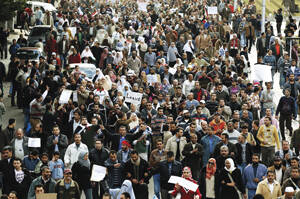Church leaders watched the unfolding political drama in Egypt with a mixture of hope for reform and concern over potential violence, said the head of the Franciscan Custody of the Holy Land. Pierbattista Pizzaballa, O.F.M., said on Jan. 30 that the unrest that has weakened the 30-year rule of Egypt’s President Hosni Mubarak came as a surprise to Catholics in the region.
“We all sense that these are epochal changes. None of us would have imagined these kinds of developments a few months ago,” Father Pizzaballa said. “This means that there are currents, especially in the Arab world, that now have found visible expression. This is certainly a positive sign, but it’s also worrying because we don’t know how all this will end,” he said. Mubarak’s opponents include both radical and moderate Muslim groups, and it is unclear who might assume power if the president resigns. Father Pizzaballa said he hoped that “respect for religious minorities will be preserved” in Egypt.
Francesco Zannini, who teaches at the Pontifical Institute for Arabic and Islamic Studies in Rome, said the situation in Egypt reflected the weakening political power of Arab leaders who have ruled as “monarchs” but who are threatened by changes brought by globalization. In Egypt, it was unclear whether the momentum of the unrest was great enough to bring lasting reforms, Zannini said. One big question, he said, was whether Mohamed ElBaradei, an opposition leader and Nobel Peace Prize-winner, had the capacity to govern Egypt. Zannini said that although Islamic extremists had begun to join the protests in Egypt, he doubted they will ever present a governing alternative there. According to Zannini, radical Islam was losing influence among the populations of the Middle East.
The Rev. Justo Lacunza Balda, former rector of Rome’s Pontifical Institute for Arabic and Islamic Studies, said police and military officials will not be able to stop demonstrators in Egypt or other Arab countries. “Ordinary people cannot tolerate any more the appalling conditions of human degradation in which they live. They say, ‘Enough is enough’ and believe that they have nothing to lose.”








